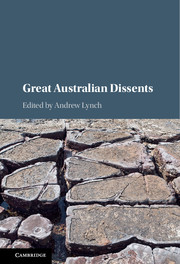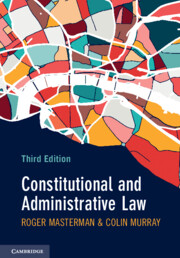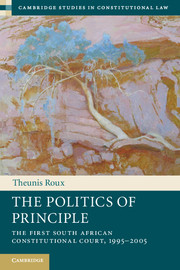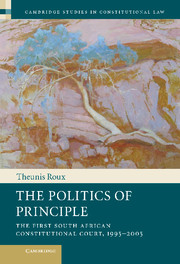Great Australian Dissents
When judges disagree, those in the minority write a dissenting opinion. This book considers the great dissents in Australian law. Their worth may derive from numerous factors, including their rhetorical force as a piece of legal reasoning or emotive power as a judicial lament for the 'error' into which the majority has fallen; the general importance of the issue at stake; as a challenge to the orthodoxy; and, sometimes, the subsequent recognition of a dissenting opinion's correctness and its ultimate vindication. On some occasions, all these features may be strongly present, on others only some. Through a diverse selection of memorable dissenting opinions, this book illuminates the topic of judicial disagreement more generally - not only through examples of instances when minority opinions have been distinctly valuable, but by drawing out a richer understanding of the attributes and circumstances which lead some dissents to become iconic, while so many lie forgotten.
- The first book on dissenting opinions in Australian courts
- Features a stimulating variety of dissenting opinions in different areas of law and their diverse claims to 'greatness'
- Commences with a full introductory chapter that contextualises the focus on individual opinions in the broader literature on judicial dissent
Product details
September 2016Hardback
9781107158535
394 pages
235 × 160 × 28 mm
0.73kg
1 b/w illus.
Available
Table of Contents
- 1. Introduction: what makes a dissent 'great'? Andrew Lynch
- 2. Justice Barton and the demise of the Inter-State Commission in the 'Wheat Case' (1915) Oscar Roos
- 3. Unrequited but still great: the dissent of Justices Dixon and Evatt in R v. Federal Court of Bankruptcy
- Ex parte Lowenstein (1938) Andrew Lynch
- 4. Justice Evatt and the lost child in Chester v. Waverley Corporation (1939) Barbara McDonald
- 5. Uther's Case (1947): Justice Dixon and the troubled legacy of the Commonwealth Immunity Doctrine Stephen McDonald and Anne Carter
- 6. 'Lone, vehement and incredulous': Chief Justice Latham in the Communist Party case (1951) George Williams
- 7. Public Prosecutor v. Oie Hee Koi (1968): not so humbly advising? Sir Garfield Barwick and the introduction of dissenting reasons to the Judicial Committee of the Privy Council Oliver Jones
- 8. The trouble with duress: the dissent of Chief Justice Bray in R v. Brown and Morley (1968) Joe McIntyre
- 9. The 'intelligence of a future day': the vindication of Justice Stephen's dissent in Henry v. Boehm (1973) Michael Coper
- 10. Justice Mason in the Australian Assistance Plan case (1975): nationhood, Federalism and Commonwealth executive power Peta Stephenson
- 11. Justice Murphy's dissent in Australian Conservation v. Commonwealth (1980): the birth of public interest standing in Australia? Matthew Groves
- 12. The essence of a fiduciary relationship: Justice Mason's dissent in Hospital Products Ltd v. United States Surgical Corporation (1984) Simone Degeling and Greg Weeks
- 13. The Chamberlain dissents (1984) Jeremy Gans
- 14. Treachery or heroism? The judgment of Justices Deane and Toohey in Leeth v. Commonwealth (1992) Amelia Simpson
- 15. Justice Dawson's steadfast defence of the 'very essence of political discussion' in Langer v. Commonwealth (1996) Adrienne Stone and Kristen Walker, QC
- 16. Certainty, co-existence and the legacy of Mabo: Justice North in the Miriuwung Gajerrong native title case (2000) Sean Brennan
- 17. When liberty divides: judicial cleavages and their consequences in Al-Kateb v. Godwin (2004) A. J. Brown
- 18. He who would not be muzzled: Justice Heydon's last dissent in Monis v. The Queen (2013) Gabrielle Appleby and Heather Roberts.






.jpg)